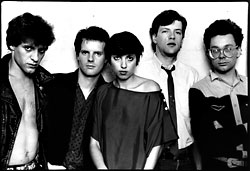One of the best music teachers who inadvertently schooled me was former Fallout Records owner Tim Hayes. Though he wasn’t an original owner (that claim belongs to Russ and Janet Battaglia and, early on, Bruce Pavitt), Hayes was the passionate employee who stepped up when the iconic Capitol Hill store fell on hard times and kept it afloat for several years before its heartbreaking closure in 2003. He’s responsible for a good chunk of my punk-rock education, thanks to my habit of hitting Fallout every Tuesday to see what new 7-inches had come in, either randomly buying things based on familiar record labels and intriguing artwork or choosing stuff more reliably via the recommendations of Hayes himself. When I tell him this, he seems genuinely moved but is quick to quell my accolades with a wry shot of humility. “Ah, I used to do the same thing,” he says, while I reminisce about discovering bands like Drive Like Jehu, Ruby Falls, and Unwound, not to mention zines Big Takeover, Outpunk, and Rollerderby and comics by fantastically imaginative artists like Julie Doucet and Roberta Gregory.
As satisfying as that nostalgic detour may be, I’m really interested in Hayes’ latest endeavor, the new cocktail lounge and restaurant called Tigertail that he’s opening in Ballard later this summer. Located a few doors down from the Tin Hat on 65th, the new space is envisioned by Hayes as a place with reasonably priced, Pan-Asian small plates, quality cocktails, and plenty of independent spirit—he plans to hold student-film screenings in the bar a few nights a month and generally cultivate an atmosphere attractive to fans of unconventional, edgy art. “It’s something I think the [North End] community is really hungry for and something we want to feed,” he enthuses. “We’re going to have a big projection screen right over the bar.” What’s more, Hayes plans on busting out plenty of his own stash of covetable old-school video footage. “I have so much stuff, it’s insane—I have old Stooges and MC5 stuff no one’s even seen.” And of course, the quality of the bar’s soundtrack is sure to be sublime, as Hayes assures me that his notoriously deep record collection will be in heavy rotation. “You name it, I’ll have it,” he chuckles. Construction is projected to be completed by late August or early September—keep your eye on this column for an official opening date.
Despite all the crate digging I did at Fallout, I was never exposed to local avant-punk pioneers Chinas Comidas, a short-lived but highly influential Seattle band that broke new ground alongside the like-minded, Dada-inspired act Red Dress in the late ’70s. Fiercely feminist frontwoman Cynthia Genser (aka “Chinas”) was a commanding, cerebral performer in the poetry-driven tradition of Patti Smith, delivering her vivid, subversive screeds over the nimble, Clash-and-Television-tinged sounds of guitarist Rich Riggins, bassist Dag Midtskog, and drummer Brock Rock while keyboardist Mark Wheaton provided occasional dark flashes of proto-new-wave ambience. Along with members of U-Men and the Blackouts, one of their biggest fans was Fantagraphics store manager Larry Reid, who helped promote their shows back in the day and is coordinating a Chinas Comidas reunion of sorts (sadly, due to a death in the family, Genser will not be performing) in support of their recently released, self-titled compilation this Saturday, July 14, at the Georgetown store (1201 S. Vale St.). “I think that their literate approach had an influence on a lot of younger musicians,” says Reid. “And I don’t think they are given enough credit for it. They talked about oppression of the state, but not in a ham-fisted way.” Along with a series of house parties and gallery performances, Genser regularly did readings in bars and clubs with fellow local poet Steven Jesse Bernstein. After several West Coast appearances with Black Flag, Fear, and the Germs, Chinas Comidas toured the East Coast with the Dead Kennedys, breaking up just as they were managing to attract appreciative nods from influential underground press like Slasher. “It’s important for people to recognize that lightning didn’t strike Seattle in 1991,” continues Reid. “The punk community wasn’t big then, but it was pretty adventurous. The songs that Chinas Comidas performed really spoke to [what was then] an audience that started out in the dozens, ended in the hundreds, and eventually grew into what it is today.”
China Comidas’ Rich Riggins and Dag Midtskog will also be performing Thurs., July 12, at the Funhouse (206 Fifth Ave. N.) and Friday, July 13, at Bop Street Records (5219 Ballard Ave. N.W.).








